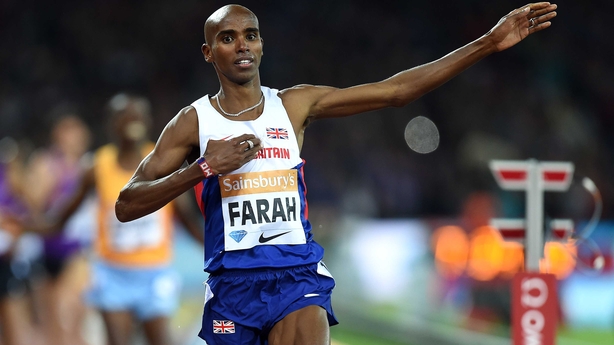Mo Farah has insisted he is "a clean athlete who has never broken the rules" after fresh allegations were published about his coach Alberto Salazar.
The American coach has again found himself at the centre of doping allegations after a report from the United States Anti-Doping Agency, which was leaked to the Sunday Times, alleged he may have abused prescription medicines and drug infusions.
Four-time Olympic champion Farah has remained loyal to Salazar, who has repeatedly denied all accusations of wrongdoing since doping allegations against the head coach at the Nike Oregon Project were first broadcast by BBC's Panorama programme in June 2015.
The Briton said in a statement: "It's deeply frustrating that I'm having to make an announcement on this subject.
"I am a clean athlete who has never broken the rules in regards to substances, methods or dosages and it is upsetting that some parts of the media, despite the clear facts, continue to try to associate me with allegations of drug misuse."
Salazar has consistently vehemently denied accusations of wrong-doing, while Farah himself has never been accused of any.
The Sunday Times claims that a report from the United States Anti-Doping Agency reveals Salazar gave six leading American runners intravenous drip infusions which "almost certainly" broke anti-doping rules.
The report, the newspaper says, states that the athletes were given infusions of the chemical L-carnitine, a naturally-produced amino acid prescribed as a supplement for heart and muscle disorders. It is not a banned substance for athletes, but infusions of more than 50 millilitres in the space of six hours are prohibited.
The Sunday Times says USADA was also, separately, still investigating the use of L-carnitine by Farah at the time the report was written in March 2016.

The newspaper claims Salazar even boasted to Lance Armstrong of the "amazing" benefits of the drug before the disgraced former cyclist's downfall.
The USADA report also says that Salazar gave athletes, including Farah, prescription drugs they had no medical need for in order to aid performance, according to the newspaper.
For Farah, the Sunday Times says, this included potentially dangerous doses of permitted vitamin D medication to boost his testosterone levels.
Farah's British doctors intervened over concerns for his health, the Sunday Times says the USADA report claims.
It also reportedly says Farah was given an infusion of L-carnitine - the volume unknown - shortly before his London marathon debut in 2014 from medical staff at UK Athletics, who were advised by Salazar and his staff.
"To our knowledge, all doses administered and methods of administration have been fully in accordance with WADA"
UK Athletics, speaking on behalf of the doctor who administered the infusion, said in a statement to the Sunday Times: "To our knowledge, all doses administered and methods of administration have been fully in accordance with WADA (World Anti-doping Agency) approved protocol and guidelines."
The Sunday Times says Farah told them two years ago that he had "tried a legal energy drink" containing L-carnitine, but "saw no benefit" and did not continue with it.
The USADA report, which the newspaper says was leaked by the Fancy Bears hacking group, also accuses Salazar of looking to impede its investigation, according to the Sunday Times.
Salazar said athletes were given L-carnitine in "exactly the way USADA directed", the Sunday Times says.
In was in June 2015 that BBC's Panorama programme first broadcast allegations Salazar had violated anti-doping rules.
USADA launched an investigation into Salazar - Farah was questioned by USADA lawyers in the summer of 2015 as part of that investigation - but it has never announced it has uncovered any evidence of wrong-doing.
Farah said at the time that his name had been "dragged through the mud", but he has remained loyal to Salazar.
The Briton has won four Olympic and five world titles over 5,000m and 10,000m since relocating to the United States to link up with Salazar in 2011. This will be his final season on the track.
Press Association Sport has made efforts to contact USADA, Nike and UKA, but has yet to receive a response.

